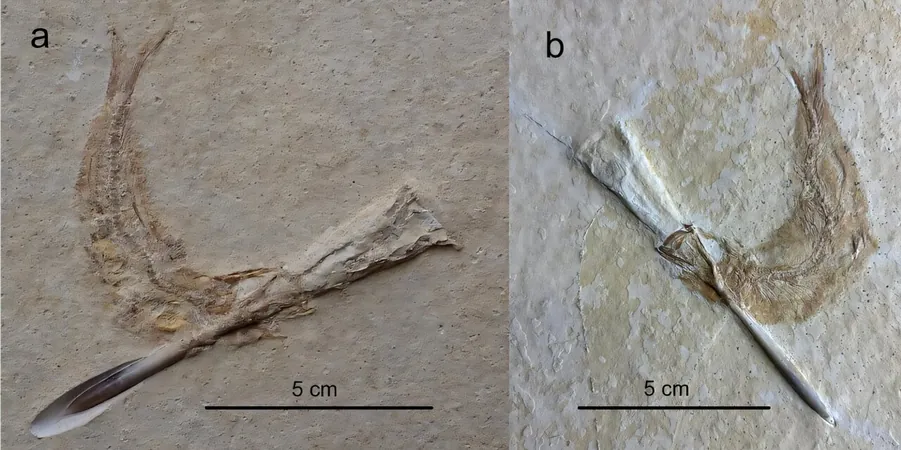
Shocking Discovery: Jurassic Fish Suffocated by Squid-like Creatures!
2025-07-04
Author: Ming
Unraveling an Ancient Mystery
In a groundbreaking study led by Dr. Martin Ebert and Dr. Martina Kölbl-Ebert, researchers have uncovered a startling detail about the Tharsis fish—an extinct Jurassic species. Their investigation of thousands of fossil specimens revealed that these fish, often still in their juvenile stage, tragically choked to death on belemnites, ancient squid-like cephalopods.
A Dive into Fossil Riches
The Tharsis fish, prevalent in the marine deposits of Solenhofen, has become a focal point of paleontological studies thanks to the remarkably preserved fossils found in the Eichstätt-Solnhofen basins. This region is renowned not only for its exquisite fossil records, including the iconic Archaeopteryx, but also for its unique environmental conditions during the Late Jurassic—high salinity and low oxygen levels.
The Fatal Dinner of Tharsis
Despite being the second most common genus in these fossils—with around 4,200 specimens—the Tharsis fish encountered a rare but deadly dining experience. The belemnites, while fewer in number, were often lifeless remnants floating in the water, potentially lured by algae growth that made them resemble food. Unfortunately, for Tharsis, these creatures led to fatal consequences.
Choking on History
Previous fossil studies overlooked this phenomenon—fish choking on their prey—mainly due to the overwhelming abundance of Tharsis specimens. The researchers discovered some of these fossils still had belemnites lodged in their throats—a clear indication of their struggle for survival. Dr. Kölbl-Ebert noted that although Tharsis were known micro-carnivores, their unfortunate encounters with belemnites had never been documented until now.
Nature's Cruel Twist of Fate
As the researchers delved deeper, they postulated that the belemnites might have been coated in algae, giving off an appealing scent that misled the Tharsis fish into perceiving them as a meal. But the design of the belemnite was a trap—its tapered end fit into the Tharsis mouth, yet its increasing width further along made it impossible for the fish to swallow completely.
The Grim Reality of Suffocation
Ultimately, these fish found themselves in a dire situation. Unable to expel the belemnite through their gills, the Tharsis faced a swift demise, a brutal reminder of the harsh realities of prehistoric life. Modern observations indicate that fish with large prey stuck in their throats can succumb to oxygen deprivation within hours.
A Revelation for Paleontology
This remarkable study sheds light on the complexities of ancient ecosystems and the predatory mishaps that could dictate survival. As we delve deeper into the stories told by fossils, who knows what other shocking revelations await?




 Brasil (PT)
Brasil (PT)
 Canada (EN)
Canada (EN)
 Chile (ES)
Chile (ES)
 Česko (CS)
Česko (CS)
 대한민국 (KO)
대한민국 (KO)
 España (ES)
España (ES)
 France (FR)
France (FR)
 Hong Kong (EN)
Hong Kong (EN)
 Italia (IT)
Italia (IT)
 日本 (JA)
日本 (JA)
 Magyarország (HU)
Magyarország (HU)
 Norge (NO)
Norge (NO)
 Polska (PL)
Polska (PL)
 Schweiz (DE)
Schweiz (DE)
 Singapore (EN)
Singapore (EN)
 Sverige (SV)
Sverige (SV)
 Suomi (FI)
Suomi (FI)
 Türkiye (TR)
Türkiye (TR)
 الإمارات العربية المتحدة (AR)
الإمارات العربية المتحدة (AR)